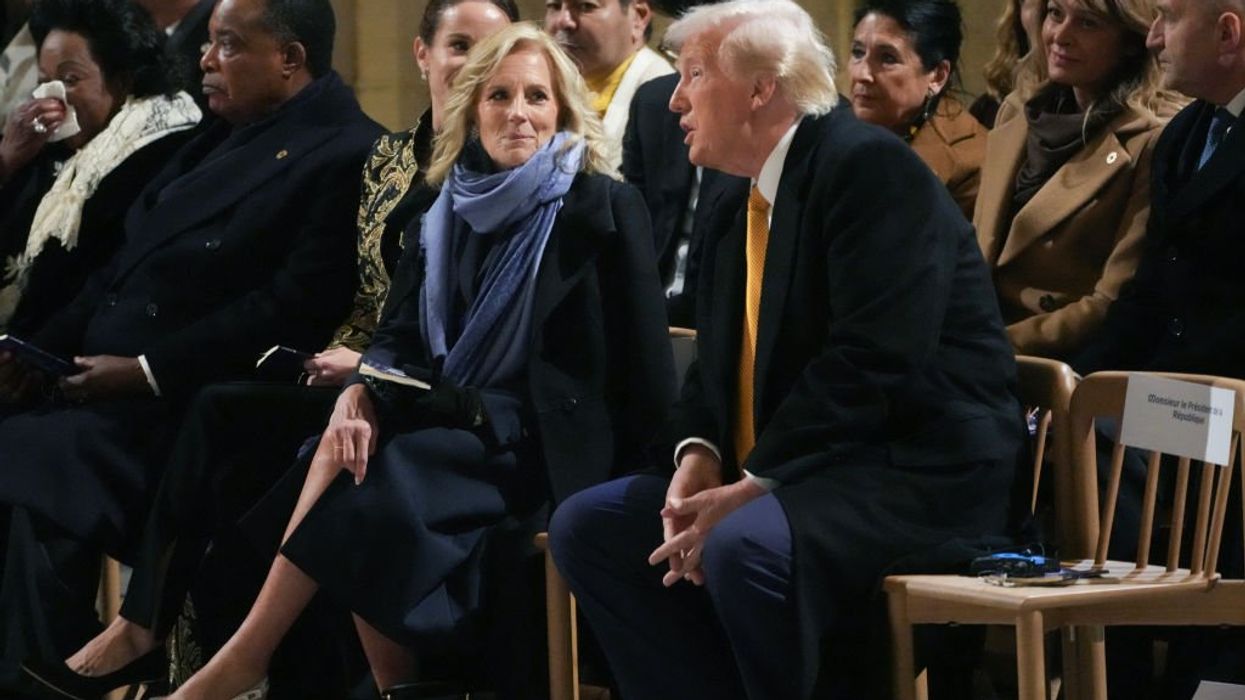
© 2024 Blaze Media LLC. All rights reserved.
Red, Swing or Blue States: Which Do You Think Gets Scrutinized More Over Voting Laws?
October 15, 2014
Expert: Voting change in Colorado “takes us back to the corruption of 19th-century Tammany Hall.”
If you were responsible for making sure every eligible vote in your state counts, without any double votes or manipulation, how would you do it?
After the Supreme Court overturned a key part of the Voting Rights Act in 2013, several states have attempted to tighten up voting requirements in order to safeguard their elections from fraud. The court determined it was unconstitutional to require certain states get federal approval before changing their election laws. The ruling allowed states to take matters into their own hands to institute measures that ensure the integrity of their elections.
But some states are coming under fire for those changes, while others aren't.
 A woman votes uses an electronic voting machine in Portage, Ohio, Nov. 6, 2012. The Buckeye State eliminated its "golden week" � where voters can register and vote in the same day � as a measure to reduce fraudulent votes (Getty Images)
A woman votes uses an electronic voting machine in Portage, Ohio, Nov. 6, 2012. The Buckeye State eliminated its "golden week" � where voters can register and vote in the same day � as a measure to reduce fraudulent votes (Getty Images)
One such example came in February, when the Ohio legislature agreed to eliminate the �golden week� at the beginning of the election period where Ohioans can both register to vote and cast an in-person absentee ballot.
�There was a calculated attempt on behalf of political operatives to register and vote simultaneously when they were not eligible to do so, Ohio decided to change the law so that couldn�t happen again,� J. Christian Adams, a former Justice Department official and counsel at the Election Law Center, told TheBlaze.
Opponents of such protective measures characterize the efforts as �discriminatory� restrictions that will �disenfranchise� certain groups of voters. An excerpt from New York Times editorial board Sunday sums up this side of the argument:
Republican officials ... around the country are battling down to the wire to preserve strict and discriminatory new voting laws that could disenfranchise hundreds of thousands, if not millions, of Americans," the opinion reads. "Similar laws have been aggressively pushed in many states by Republican lawmakers who say they are preventing voter fraud, promoting electoral 'integrity' and increasing voter turnout. None of that is true.
Federal and state court rulings in Texas, Wisconsin and Pennsylvania have agreed with the NYT editorial opinion: �There is virtually no in-person voter fraud; the purpose of these laws is to suppress voting.�
But Republican voting experts say that couldn�t be further from the truth, citing recent high-profile examples that have raised questions about the real voting fraud numbers.
�It's ironic that folks are anxious to return the law to a situation where it�s easy to commit voter fraud,� Adams said. �How much voter fraud is OK? Is one unit acceptable? Five units? One hundred units? How many instances do we have to have, and whose vote should be sacrificed?�
Reinforcing the point, Ohio Secretary of State Jon Husted released evidence in July �that a single vote can determine the outcome of an election.� Sixteen local races and four local issues on the ballot in the 2014 primary election were decided by one vote or through a tie breaker.
�In less than a year, 63 races in Ohio have been decided by one vote. This underscores the importance of election access and integrity, and why it is so important to make it easy to vote and hard to cheat,� Husted said.
Nevertheless, federal offices -- partnering with leftist advocacy groups -- filed legal motions to either stay or remove some state voting laws. In the memo filed in a North Carolina suit, the Justice Department argued that �unverified voters nevertheless represent a low level of possible fraud in view of the nearly half a million people who use (same day registration),� and claimed, �the provisions at issue were motivated by a discriminatory purpose.�
But the numbers simply don't support the Democratic argument that Republicans have an agenda to suppress black voters in order to gain an electoral advantage in states like North Carolina.
In 2008 (when Democrats won the state) and 2012 (when Republicans won), African-Americans made up 23 percent of the electorate, according to the Washington Post. But when George W. Bush won the state by 12 points in 2004, exit polls showed 26 percent of the electorate was African-American.
Not all states seem to merit close scrutiny of their voting laws. Historically blue states � including ones that have stricter laws than some swing states � do not get the same level of scrutiny and legal action.
New York, Delaware, Pennsylvania, Michigan and Connecticut are among some of the historically blue states that lean Democratic in presidential elections but have no early voting or require an excuse for an absentee ballot. New Hampshire is a prime example: The state�s strict new voter identification law going into effect in 2015 eliminates student IDs -- and state-issued voter identification cards -- as valid forms of ID. The Justice Department has yet to file a suit in that historically Democratic state.
 People wait outside Mt. Bethel Baptist Church on Nov. 6, 2012 in Washington, D.C. Two-thirds of U.S. offers some sort of early voting. Ten states offer same-day registration. (EVA HAMBACH/AFP/Getty Images)
People wait outside Mt. Bethel Baptist Church on Nov. 6, 2012 in Washington, D.C. Two-thirds of U.S. offers some sort of early voting. Ten states offer same-day registration. (EVA HAMBACH/AFP/Getty Images)
Voting experts say this disparity between how voting rights advocates chase after laws in certain states versus others is highlighted best by the �nonsensical� arguments coming from the Justice Department in the North Carolina case, with respect to early voting opportunities.
�The way they�ve structured their argument is, if you have any early voting and then you cut it back at all, you�ve violated the law. But if you have no early voting, you haven�t violated the law,� said Robert Popper, a senior attorney with the conservative watchdog group Judicial Watch. �That makes no sense, but that is their argument.�
Popper said this is one of the Justice Department�s primary tactics for targeting red or swing states.
�The way they set it up is as suspicious as a layman would think,� Popper told TheBlaze. �To argue, �If you have [early voting] then take it away, you violate the law, but if you never had it, then you aren�t breaking the law. Frankly, that�s as kooky as it sounds.�
And some voting process changes in primarily blue or swing states have gone completely uncontested by the Justice Department or by leftist advocacy groups, when it appears the decision may help a Democratic cause. Last year, Colorado's Democratic-controlled state legislature approved � and Democratic Gov. John Hickenlooper signed � a bill drastically changing the voting process in the Centennial State: getting rid of all traditional polling stations and mailing each voter a ballot instead.
The law also established same-day registration, �which allows someone to appear at a government office and register and vote on the same day without showing photo ID or any other verifiable evidence that establishes identity,� National Review points out. �If they register online a few days before, no human being ever has to show up to register or vote. A few keystrokes can create a voter and a �valid� ballot.�
Colorado�s upcoming U.S. Senate race between Democratic Sen. Mark Udall and Republican Cory Gardner is crucial, since the outcome could determine the balance of the Senate. The most recent Colorado Senate race in 2010 was determined by an 11,000-vote margin.
�These worries aren't theoretical. This last election, El Paso County caught a person who registered five times using false information. County officials caught him, but only because they had 29 days before the election to investigate the registration fraud,� Colorado State Attorney Scott Gellar said. �Under an election-day registration scheme, this person would have been able to vote several times.�
Colorado�s El Paso County clerk, Wayne Williams, said the new law �takes us back to the corruption of 19th-century Tammany Hall,� and will degrade public confidence in the voting process and ballot integrity.
Hans von Spakovsky, a former Federal Election Commission official who leads the conservative Heritage Foundation�s Election Law Reform Initiative, said the state-by-state scrutiny from the Justice Department and leftist advocacy groups boils down to an intimidation and fear-mongering tactic.
�Unfortunately, they want to use this to scare their base,� he said. �You know they try to make this argument, �Republicans are trying to suppress your vote, therefore you need to go vote,� and it helps them to try to raise money.�
�And frankly, most of the recent convictions for voter fraud have all been democrats,� von Spakovsky continued. �And so you have to wonder, are they against putting in place rules that will deter and prevent voter fraud because it will make it harder for them to commit it?�
�
Follow Elizabeth Kreft (@elizabethakreft) on Twitter
Want to leave a tip?
We answer to you. Help keep our content free of advertisers and big tech censorship by leaving a tip today.
Want to join the conversation?
Already a subscriber?
more stories
Sign up for the Blaze newsletter
By signing up, you agree to our Privacy Policy and Terms of Use, and agree to receive content that may sometimes include advertisements. You may opt out at any time.
© 2024 Blaze Media LLC. All rights reserved.
Get the stories that matter most delivered directly to your inbox.
By signing up, you agree to our Privacy Policy and Terms of Use, and agree to receive content that may sometimes include advertisements. You may opt out at any time.


